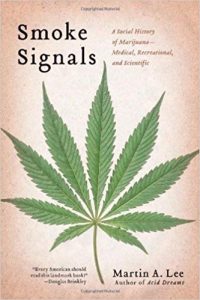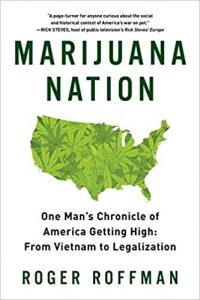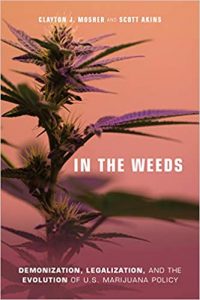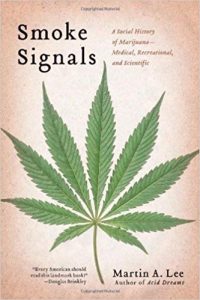Former New York Times reporter Alex Berenson has been all over the mainstream media this past week, peddling fear and falsehoods in the guise of objective reporting.
Berenson’s premise is simple: Harry Anslinger may have been a racist, but he was right about the harms of marijuana.
His new book, Tell Your Children: The Truth About Marijuana, Mental Illness, and Violence, has landed him plum op-ed placements in both the Times and the Wall Street Journal. Fox News has featured him on both Tucker Carlson Tonight and President Trump’s daily morning briefing, Fox and Friends. Malcolm Gladwell heralded Berenson and his book in the current issue of The New Yorker under headline “Is Marijuana As Safe As We Think?” Berenson’s premise, in a nutshell, is this: “Harry Anslinger may have been a racist jerk, but 85 years ago he was right about marijuana.”
Alarmed at the attention being paid to this long-debunked notion, I picked up a copy of Tell Your Children and started reading.
It does not open well. In the introduction, Berenson relates a chilling anecdote:
My wife Jacqueline is a forensic psychiatrist who specializes in evaluating mentally ill criminals… One fine night a couple of years ago, we were talking about a case, the usual horror story, somebody who’d cut up his grandmother or set fire to his apartment—typical bedtime chat in the Berenson household—and she said something like, “Of course he was high, been smoking pot his whole life.”
“Of course?” I said.
“Yeah, they all smoke.”
“Well… other things too, right?”
“Sometimes. But they all smoke.”
That’s Berenson’s anecdote, which serves as the book’s creation myth.
This Is Also Evidence
Now here’s my anecdote. It involves about 25,000 people peaceably assembling to get high together at The Emerald Cup, an annual competition to determine the finest (and highest potency) organically-grown cannabis in California:
The Emerald Cup gates open at noon. The musical acts go way past midnight. For the past two years, over the course of an entire weekend, exactly zero people have been arrested. Nobody has been sent to the hospital—a truly astonishing safety record for a public event of that size and duration. I personally attended the most recent Emerald Cup. I didn’t witness or even hear about a single argument that got more heated than two people debating the merits of OG Kush vs. Sour Diesel.
Does that mean cannabis is harmless?
No, of course not.
“Harmless” is a pretty high bar, especially when you consider that something can be both incredibly beneficial and potentially fatal, like vigorous exercise leading to a heart attack or hydration leading to hyponatremia. The over-the-counter pain relievers known as NSAIDs (think of ibuprofen brands like Advil and Motrin) offer relief to millions, but they’re estimated to cause at least 16,000 deaths per year in the United States due to their side effects.
Damn, This Could Have Been a Good Book
Cannabis famously has never been proven to cause a single fatal overdose, but there are valid concerns about other potential health risks, especially for younger people with still developing brains and anyone with a history of schizophrenia or a latent susceptibility to it.
This is a case study in misusing statistics to make oversimplified arguments about human behavior.
And so, with legalization increasingly becoming the law of the land, a thoroughly researched, objective look at the latest science surrounding cannabis and mental illness would be both well-timed and a welcome addition to the literature.
But unfortunately, Alex Berenson is a manipulative writer. His book is full of false alarms, nonsense correlations, and long-debunked theories.
He stretches and warps the meaning of peer-reviewed studies so much that one UCLA researcher called him out on it earlier today via Twitter.
In response to the recent @NYTimes editorial on cannabis and as a committee member on the @theNASEM #cannabis and #cannabinoids report we did NOT conclude that cannabis causes schizophrenia.
What Advocates of Legalizing Pot Don’t Want You to Know https://t.co/4xcl5iVWSS
— Ziva Cooper (@zivacooper) January 9, 2019
Jesse Singal at New York magazine went one step further. He took Berenson’s data, conclusions, and crunched the numbers. They led him to dismiss Tell Your Children as “a case study in how to misleadingly use statistics to make oversimplified arguments about human behavior and public policy.”
Well, actually, the full quote was slightly more nuanced, as it referred not to the entirety of Berenson’s book, but only to one of its central assertions. I purposefully took the statement out of context to increase its rhetorical impact.
And to now to paraphrase the old anti-drug scare commercial: I learned it by watching you, Alex Berenson.
A Master Class in Logical Fallacies
From cover to cover, Tell Your Children offers up a master class in selective quoting, logical fallacies, straw man arguments, ad hominem attacks, “expert shopping,” and cherry picking statistics. For example, to support his claim that cannabis legalization has led to a frightening spike in violent crime, Berenson writes that “the first four states to legalize have seen sharp increases in murders and aggravated assaults since 2014.”
Well, here’s how Singal at New York judged that assertion:
Despite Berenson’s claim of “sharp increases in murders and aggravated assaults since 2014” in Oregon, the FBI reported that the murder rate there went up a grand total of 1.0 percent from 2015 to 2016, as compared to a nationwide uptick of 7.9 percent, and then dropped by 11.6 percent between 2016 and 2017, a significantly steeper drop than in the rest of the country. If one insists on positing a tight causal relationship between pot laws and murder rates, one could just as easily argue that Oregon’s homicide trajectory has been softened by pot legalization in these years, at least relative to national trends, saving a number of Oregonians’ lives.
Berenson has pretty clearly been caught purposely leading his readers to a wholly false conclusion. Call me old fashioned, but back in my day weed still had seeds, and we called such cynical behavior “bullshitting to make a buck.”
A Second Opinion
For a second opinion I contacted Dr. Peter Grinspoon, a primary care physician at Massachusetts General Hospital, an instructor at Harvard Medical School, and a board member of the advocacy group Doctors For Cannabis Regulation. He says the presence of a malicious deception at the heart of Tell The Children means we need to be extra skeptical when evaluating the rest of his book’s seemingly outlandish claims, including Berenson’s opening anecdote.
Dr. Peter Grinspoon, Harvard Medical School instructor
“I’ve worked in an inner city clinic in Boston for the last ten years, and we haven’t attributed any violent crimes to cannabis. So I tend to think the author is using this unsubstantiated origin story, which makes no distinction between correlation and causation, to prop up his phony theories,” Grinspoon says.
“Certainly people can decompensate if they have mental illness and use high quantities of cannabis,” Grinspoon adds, “and I’m sure that in his research he uncovered horrific individual cases of that happening. But you just can’t attribute crime after crime to cannabis the way his wife does in that fantastical introduction.”
A Third Opinion
Beau Kilmer is co-director of the highly respected RAND Drug Policy Research Center. He just took Alex Berenson to task on Twitter for his bullshit claims. Specifically, Kilmer posted the key finding of an extensive RAND study that was actually published by none other than the Office of National Drug Control Policy (popularly known as the Drug Czar’s office). A study that flatly concluded: Marijuana use does not induce violent crime, and the links between marijuana use and property crime are thin.
How does that feel: You’re trying to whip up some Reefer Madness and the Drug Czar dunks on you.
You’re Joking, Right?
Speaking of Reefer Madness, it just so happens that the notorious and widely ridiculed 1936 propaganda film was originally titled Tell Your Children—just like Berenson’s book. It’s an homage I originally took to be ironic. And then I read deeper and realized that Berenson is literally trying to redeem the War on Marijuana in its entirety, going all the way back to Harry Anslinger.
In Tell Your Children, he writes:
The great villain in the story legalizers tell about prohibition is Harry Anslinger, [who] served as the head of the Federal Bureau of Narcotics—predecessor of the modern Drug Enforcement Administration—from 1930 to 1962. The marijuana lobby views Anslinger as a racist anticannabis fanatic who exaggerated the drug’s dangers to convince Congress to prohibit it.
They’re partly right…. Harry Anslinger may have been a racist jerk, but 85-years ago he was right about marijuana.
In all seriousness, Berenson takes the position that Anslinger deserves a slap on the wrist for his overt and profoundly harmful racism, but he also deserves a pat on the back for recognizing the dangers of cannabis so clearly.
A Refresher Course in Anslinger
Hang on. I’ve studied the life of Harry Anslinger. I’ve spent 15 years writing about cannabis culture and history. Anslinger’s racism and his views on marihuana can not be so neatly decoupled.
 This is a better book.
This is a better book.
America’s earliest cannabis users were Mexican immigrants along the Southern border, and New Orleans’s ethnically diverse jazz culture. If you happen to irrationally hate both those groups of people, and consider them inferior to yourself in every way, and they’re the only people you know who smoke reefer on the regular, then doesn’t it just stand to reason that cannabis is dangerous and debasing and the government should use it as a pretext to launch a proxy war against minorities, the poor and all other sorts of undesirables? That was basically Harry Anslinger’s program in a nutshell.
Fast forward 85 years. Tens of millions of Americans have suffered arrest and untold hardships because of cannabis prohibition. The federal government’s War on Marijuana remains so overwhelmingly racist today—not to mention costly and counterproductive—that even Alex Berenson, with his virtuosic bullshitting, can’t deny that it vastly disproportionally targets the poor, minorities and other marginalized communities.
‘Let’s Just Decrim’
Rather than engage in an earnest discussion of the harms of prohibition, however, Berenson dismisses the whole matter with a shoulder shrug, a lame attempt at whataboutism, and some magical thinking. He writes:
Yes, marijuana arrests disproportionately fall on minorities, especially the black community. But marijuana’s harms also disproportionately fall on the black community… If arrests for marijuana possession are a major racial justice concern, the solution is decriminalizing possession, turning it into a violation equivalent to littering.
This delusional thinking allows Berenson to advocate treating weed like littering, without feeling compelled to explain who will grow the decriminalized cannabis. Or where people will purchase it. And from whom. And who will lab-test it for potency and purity.
Marijuana legalization opponents often seek to cast “decriminalization” as a sensible middle-ground alternative. But decrim still has huge problems, the biggest of which is that use and possession remain under the purview of the criminal justice system.
— Christopher Ingraham (@_cingraham) January 8, 2019
Under strict decriminalization, there is no taxed and regulated industry that ensures law-abiding businesses control the trade, instead of criminal syndicates. And yet Berenson remains dead set against the legalize-and-regulate systems currently evolving in Canada and a growing number of American states.
And if not regulated, legal cannabis, then what? A hippie freak fest where we all share the herb while singing Kumbaya?
I’ll Join the Chorus
I’m actually way down for that model, though I doubt that’s what Berenson has in mind. I honestly don’t know how he sees this whole “weed is like littering” plan working out. I strongly suspect he doesn’t, either.
 So is this.
So is this.
What I do know is that he desperately wants to stake out a rhetorical position that allows him to scare monger mightily on cannabis, drawing maximum attention for his book without taking any responsibility for the terrible injustices that come along with a fierce bout of Reefer Madness.
To that end, Berenson likes to charge the cannabis advocacy community with “sharply overstating the level of marijuana-related incarceration” in the United States. But at the same time he fails to understand or acknowledge the myriad ways a cannabis arrest can fuck up your life without necessarily landing you behind bars—like loss of employment, property seizure, eviction from housing, loss of healthcare, and having your children taken away by protective services.
Or you could get shot to death when a SWAT team no-knock raids your house looking for a few ounces of raw plant matter.
Shills for Big Marijuana
Berenson also likes to accuse people like me, who believe cannabis has powerful therapeutic benefits, of being shills for Big Marijuana. But I’ve actually been writing non-stop about my fear of a “corporate cannabis” take-over since 2013.
So here’s something Berenson and I can agree on: Just say no to Big Marijuana. We also agree that there should be a lot more research into cannabis. But while I think independent scientists and researchers should be free to thoroughly and honestly assess both the risks and benefits of the plant and its components, Berenson doesn’t seem to give a damn about medical cannabis patients. Those folks, who now number in the tens of millions in a majority of American states, the author dismisses out of hand as fraudsters and fakers.
In 2019, that seems almost too ignorant to dignify with a response.
Here’s What We Know
But apparently a response must be given, because evidence is a proven bullshit cleanser. To restate the obvious (because Berenson seems to be unaware of same):
- THC has been an FDA approved treatment for nausea and vomiting associated with cancer chemotherapy since 1985.
- CBD is currently undergoing fast-tracked federal clinical trials to determine its efficacy in treating severe pediatric seizure disorders like Dravet’s Syndrome, after countless families and cannabis growers uprooted their lives or broke the law to provide seriously ill children with access to CBD-rich cannabis oil.
- Cannabis has also been shown to be effective in treating Parkinson’s Disease, ALS, MS, neuropathic pain, glaucoma, PTSD, Diabetes, anxiety, depression and wide range of other ailments.
There’s a History Here
So why do we still know so relatively little about such a supposed miracle drug?
Largely because the federal government and Big Pharma have been conspiring for the last fifty years to block all research into whole-plant cannabis as a medicine, while funding all manner of biased research into cannabis as a menace. Through the National Institute on Drug Abuse (NIDA), the federal government to this day maintains a total monopoly on the nation’s sole legal source of cannabis for clinical studies, and they only tend to supply researchers looking for harms, instead of benefits.
Huzzahs From the Mainstream Media
You wouldn’t know any of this to read Malcolm Gladwell’s recent feature article in The New Yorker. That embarrassment, which has been owned by Twitter followers this week, claims to be a call for more research into cannabis and mental illness. But it pretty much takes Tell Your Children at face value, without a single dissenting expert or study cited.
 Coming in April. It’s good too.
Coming in April. It’s good too.
More ominously, Berenson’s spurious claims also made it unchallenged onto Fox and Friends—a media hit that’s daily appointment television for the highly impressionable President of the United States.
In a studio interview with Fox host Steve Doocy, Berenson was asked to identify the dark forces that want to push the Devil’s Lettuce on an unsuspecting populace. His reply reads like a carbon copy of President Trump’s personal enemies list, including the “elite media,” Democrats, and George Soros. All that was missing was a gory anecdote about an undocumented Mexican immigrant who smoked a joint shortly before ax-murdering a pretty young white girl.
Of course the entire Fox and Friends interview lasted less than two minutes, so maybe Berenson didn’t have time to squeeze it in alongside all the other dog whistles, junk science, and misleading claims that make Tell Your Children one of the most disingenuous and harmful books of 2019.


